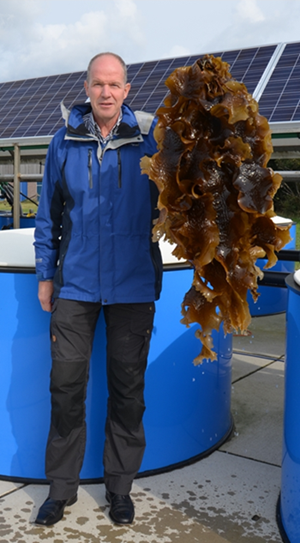Marine micro-algae, seaweeds and salt-tolerant plants as a future source of nutrition and energy
While traditional farmlands are either becoming depleted or disappearing altogether, our growing population requires food rich in high-quality protein and enough energy for a comfortable existence. Marine micro-algae, seaweeds and salt-tolerant plants grow on sunlight, carbon dioxide and nutrients dissolved in seawater. They also produce valuable biomass and oxygen. The seas and oceans of the world thus offer a myriad of opportunities for a truly sustainable and efficient production of plant biomass, which can be used as raw material for food, chemicals and energy.

However, before we can make use of these opportunities, we must first answer a number of questions, such as: How much marine plant biomass can the seas and oceans realistically produce? How can this be done in an ecologically responsible manner? And can we select for more productive species? Answering these questions opens the way for a highly attractive vision for the future: high-quality plant-based food production, cleaner seas and oceans, increased biodiversity, and an inexhaustible source of CO2-neutral energy.
In his new position as Professor of Marine Plant Biomass at the Faculty of Mathematics and Natural Sciences, Professor Klaas Timmermans will be meeting this amazing scientific and social challenge by collecting fundamental physiological, ecological and genetic knowledge and sharing it with the industry. In this way, he hopes to facilitate the transition to a marine bio-based economy.
About Klaas Timmermans
In 2014, Klaas R. Timmermans
was appointed Honorary Professor of Marine Plant Biomass at the University of Groningen’s Faculty of Mathematics and Natural Sciences. This Chair forms part of the
Ocean Ecosystems
research group, which in turn falls under the Energy and Sustainability Research Institute Groningen. The chair group’s objective is to conduct fundamental and ground-breaking applied research on micro-algae, seaweeds and salt-tolerant terrestrial plants. Professor Timmermans also works as a researcher at NIOZ, the Royal Netherlands Institute for Sea Research, and he is involved in the Master’s degree programme in Marine Biology.
More news
-
27 January 2026
ERC Proof of Concept grant for Maria Loi
-
26 January 2026
Science for Society | The AI chip of the future
